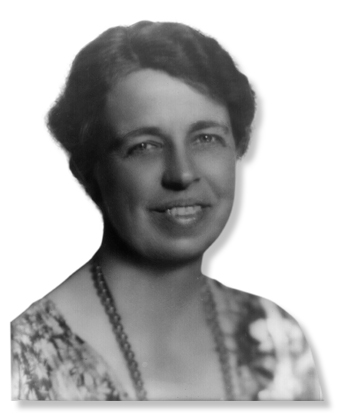Eleanor Roosevelt

When Eleanor Roosevelt died in 1962, United Nations (UN) ambassador and friend Adlai Stevenson said, “What other single human being has touched and transformed the existence of so many?” To this day, Eleanor Roosevelt is remembered as a person who brought support to millions by fighting for human rights and the freedom of the world’s oppressed people.
Eleanor was a shy young woman when she married her distant cousin Franklin D. Roosevelt (FDR) in 1905. But her life changed as her husband’s political ambitions took off. Fighting her shyness, she searched for meaningful things to do.
In the early 1900s, many social injustices existed in the United States, a country that prided itself on freedom and equality. Women could not vote. Children spent 12 hours a day working in factory sweatshops. Coal miners risked their lives working deep underground in unsafe conditions. Black Americans lived in separate neighborhoods and attended separate schools. Eleanor was concerned about the misfortunes of others, and she wanted to do something about them.
It was during World War I (1914–1918) that Eleanor plunged into what would become a lifetime of public service. With
tireless energy, she divided her time between serving at a soldiers’ canteen, visiting the wounded, working for the Navy Red Cross, and running her own large household. One family member called her “the willing workhorse.”
But it took Franklin’s near-fatal polio attack in 1921 to force Eleanor to become involved on a much grander scale. Franklin recovered from polio, but he was unable to walk without heavy metal braces on his legs. Eleanor became her husband’s legs, particularly after Franklin was elected president in 1932. She traveled around the country and the world, representing FDR and sharing with him what she saw and heard.
When Eleanor and Franklin moved into the White House in 1933, the country was gripped by the Great Depression. People were homeless, hungry, and out of work. Franklin pledged new jobs and support in his New Deal government programs.
Eleanor also went to work. In soup kitchens, coal miners’ huts, and camps for the homeless, “Eleanor Everywhere” offered her love, her time, and a ready hand to thousands of people.
Meanwhile, German leader Adolf Hitler began invading countries in Europe. As World War II (1939–1945) embroiled most of the Continent, many people tried to flee. Some appealed for help to the first lady. Throughout the 1930s and early 1940s, Eleanor helped countless Jewish people escape to the United States.
Franklin’s death in 1945 did not end Eleanor’s commitment to public service. In December, President Harry S. Truman appointed her as a member of the U.S. delegation to the United Nations. She became chairwoman of the UN’s Commission on Human Rights. The commission was asked to define the basic rights of people all over the world, such as the right to free speech and a fair trial, so that a government could not deny those rights. Trying to get nations with different customs, religions, and governments to agree on these rights was a difficult task, but somehow Eleanor succeeded. The UN General Assembly adopted the Universal Declaration of Human Rights on December 10, 1948. Eleanor’s reputation as the “First Lady of the World” was sealed.
For the many ways that Eleanor Roosevelt allowed her actions to speak volumes, and for the way she redefined the role of the first lady—or any one person—as someone who can make a difference, she remains an example of a bright light during some of the darkest days in American history.
And Let’s Not Forget . . .
Ida B. Wells-Barnett
When it came to embracing and fighting for a cause with intense passion, Ida B. Wells-Barnett had what was needed. Sixty years before Rosa Parks refused to get up from her bus seat in Montgomery, Alabama, Wells-Barnett had a similar experience on a train. She, however, bit the man who tried to physically remove her. For the rest of her life, Wells-Barnett fought against the injustices faced by both women and African Americans and used her role as an editor and journalist to almost singlehandedly lead an antilynching campaign.